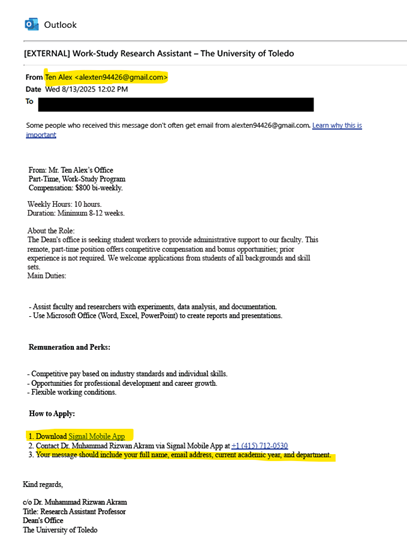Phishing Awareness
Phishing is one of the most common and dangerous cyberattacks targeting universities and health sciences campuses. Attackers impersonate trusted entities—such as professors, administrators, classmates, research collaborators, or even health service providers—to trick you into revealing sensitive information like login credentials, financial details, or research data. These attacks often occur through email, text messages, or even social media platforms.
For students, phishing attempts may target your university email, financial aid details, or access to online learning portals.
For faculty, attackers may impersonate department heads, colleagues, or journal publishers to steal research data or credentials.
For staff, phishing can involve fake invoices, HR communications, or patient-related requests designed to trick you into transferring funds or exposing protected information.
Phishing not only compromises individual accounts but can also put the entire campus community at risk, leading to identity theft, data breaches, and disruption of teaching, research, and patient care. Recognizing and reporting phishing attempts is essential to maintaining a safe and secure digital environment.
How to Recognize Phishing

- Check the sender’s email address carefully – phishing emails often mimic legitimate addresses and sometimes they do not match the name of the sender.
- Watch for spelling errors or unusual language – official communications rarely have mistaken.
- Be cautious of urgent requests – attackers often pressure you to act quickly.
- Avoid unexpected attachments or links – hover over links to verify their destination.

Best Practices
- Verify suspicious messages by contacting the sender directly through a separate communication method.
- Do not click on unknown links or download unexpected attachments.
- Report phishing attempts to the campus IT.
Campus Resources
Report Suspicious Emails - contact Helpdesk and Report the email to emailAbuse@utoledo.edu.
Quick Tips
- Think before you click—verify before trusting.
- Stay updated on the latest phishing trends and campus alerts.
- Remember: if something feels suspicious, it probably is.


